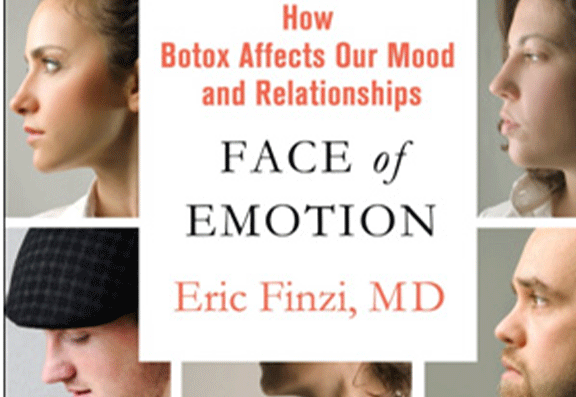A new book by Eric Finzi, MD, president of two dermatology practices and faculty member of the Dermatology Department at Johns Hopkins Medical Centre in America is making cosmetic practitioners and those involved in mental health research, rethink both the physical anatomy of the face and the relationship with neurological pathways when it comes to emotions, but also the role that botulinum toxins, such as Botox®, can have in affecting our mood and relationships with others.
This is Dr. Finzi’s first book, although he has authored over 20 research publications to date. The Face of Emotion is the result of two decades of clinical experience and original research that has shown that changing a person’s face using Botox can dramatically alter their relationships not only with others, but more crucially, with themselves.
They say a face can tell a thousand words and it is universally accepted that facial expressions portray our innermost feelings and reveal our deep-seated emotions to others. But what if the reverse were just as true? What if our facial expressions were actually the cause rather than just the consequence of our moods? It is this question that inspired Dr. Finzi, to investigate this claim further.

“Generally, we assume that our facial expressions reflect rather than direct our emotions of the moment. Yet much evidence suggests that our facial expressions are not secondary to, but rather a central driving force of, our emotions”; writes Dr. Finzi.
Our fascination in the correlation between human emotions and expressions dates back to the musings of philosopher René Descartes and the research of Charles Darwin. Dr. Finzi too understands the intricacies of the face as well as the manifold uses and benefits of Botox.
Through different pathways, the brain is able to track even the smallest changes in our muscle health and body positioning. If this is the case, Dr. Finzi argues that the brain also monitors our emotional state when facial muscles are activated through the same pathways.

If the brain recognises that when we frown, we are unhappy, could we alter the feedback the brain receives by manipulating those facial muscles that are activated and prevent unhappiness?
“I began to suspect that Botox could help control the flow of negative emotions, quieting the facial muscles that really express negativity, the muscles between the eyebrows that help create the frown. Could I change moods and help depression simply by preventing a negative facial expression?”; he explains.
Through his pioneering research, Finzi has been able to alleviate many patients from their clinical depression, simply by injecting Botox into the ‘corrugator’ frown muscles. Many of the patients in initial trials didn’t even present with visible frown lines before treatment, thus removing the argument that they felt happier and less depressed post-treatment because they looked better.
The Face of Emotion is a fascinating and bold examination of the power facial expressions have over our interior moods and a dramatic departure from the neuroscience-based school of thought that views emotions solely as the result of neurotransmitters in the brain. Dr. Finzi challenges us to rethink the causes of unhappiness and offers an alternative treatment approach which could radically change the way we think about and treat depression in the future, as well as the emotional effect that cosmetic Botox treatments have on our everyday patients looking for anti-ageing solutions.
For those interested in reading more, you can purchase Face of Emotion by Eric Finzi, MD (Palgrave Macmillan) from Amazon.
If you want to read more, the experts at Consulting Room really know what they're talking about and have put together some botox for your frown or glabella lines, botulinum toxins and Botox® FAQs just for you.
If you have more questions, you can use the botulinum toxins and Botox® question feature to talk to our panel of trained medical experts.
If you're keen to get started with any of these treatments right away then you're in luck - those clever folks also have a list of trusted, accredited botulinum toxins and Botox® clinics in your area.
Croma’s latest range brings professional in-clinic results into your everyday routine. Clean, vegan, and packed with powerhouse ingredients, these products are designed to hydrate, brighten, protect, and fight early signs of ageing.
From safety myths to unrealistic expectations, this blog breaks down the facts, clears up common misconceptions, and explains what patients really need to know before treatment.
We ask an expert skin doctor: ‘What are the benefits of LED therapy, and is it worth the investment?’
Hey, wait!
Before you go.....
Let's stay in touch, pop your details here and we'll send our editor's hand-picked updates on your fave subjects.